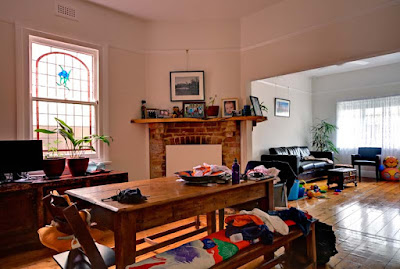Scott’s technique is to use a mix of bounced, bare bulb through a wide angle diffuser and umbrellas to modify his light. The first room I lit was a bedroom, using two flashes. The key light was a bounce flash at ¼ power above the camera on a wardrobe. A second fill flash bounced off the wardrobe was used to bring up the bed.
For the HDR shot, I switched the flashes off and took seven bracketed images from -3 to +3.
At first I preferred the HDR image using the Photomatrix Pro fusion auto processing option. However when I went back to the flash version turning up the Clarity slider it popped into life. The same went for the open plan living and dining room shot the next day. However, the ambient exposure was a bit tricky given the different levels of light into the two windows.
I balanced the key light on a door above the camera bouncing of the ceiling. I bounced the fill light off the wall opposite the stained glass window. I used a 43” shoot through umbrella to light the living room the right hand corner by the window.
After I took the shot I walked the shutter speed up and down to get the windows to pop and increased the aperture 1/3 of a stop to tone down the flash. This along with Scott's advice on using a 24mm (16mm crop) lens were some of the most useful tips I picked up from the book. The HDR exposure was interesting given the different level of natural light in the two rooms.
Overall I felt the flash images came out on top for both rooms over the HDR. The HDR image do bring a warmth to the images that the flash cannot. But in the business of Real Estate the clarity of the flash image probably wins out. With flash there is more control over the light, however it is so simple to make the HDR image after the flash exposure that it is worth doing as an alternative.





